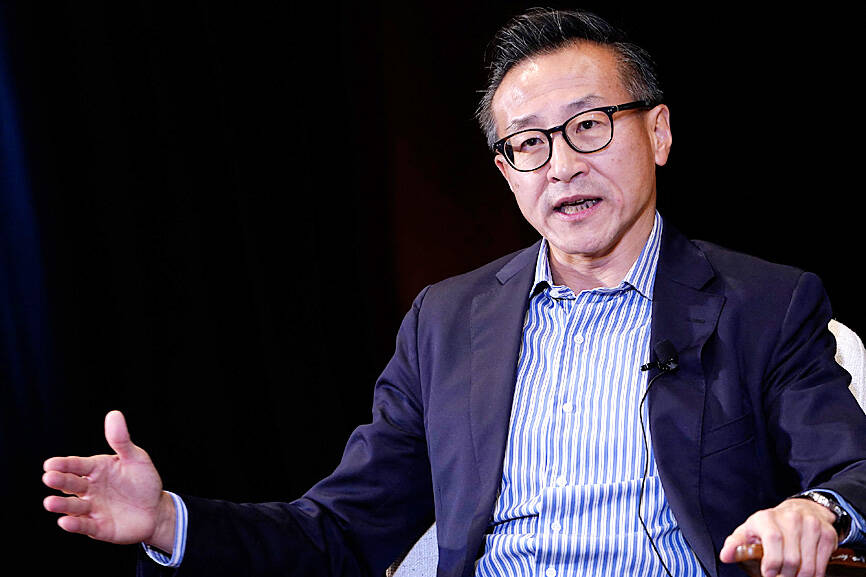Alibaba Group Holding Ltd (阿里巴巴) chairman Joe Tsai (蔡崇信) yesterday warned of a potential bubble forming in data center construction, arguing that the pace of that buildout might outstrip initial demand for artificial intelligence (AI) services.
A rush by big tech firms, investment funds and other entities to erect server bases from the US to Asia is starting to look indiscriminate, Tsai told the HSBC Global Investment Summit in Hong Kong.
Many of those projects are built without clear customers in mind, Tsai said.

Photo: AFP
From Microsoft Corp to Softbank Group Corp, tech firms on both sides of the Pacific Ocean are spending billions of dollars buying the Nvidia Corp and SK Hynix Inc chips crucial to AI development.
Alibaba itself — which last month said that it was going all-in on AI — plans to invest more than 380 billion yuan (US$52 billion) over the next three years.
Server farms are springing up from India to Malaysia, while US President Donald Trump is touting a Stargate project that envisions an outlay of US$500 billion dollars.
Many on Wall Street have begun to question that spending, especially after Chinese firm DeepSeek (深度求索) released an open-source AI model that it claims rivals US technology, but was built at a fraction of the cost.
Critics have also pointed out the persistent dearth of practical, real-world applications for AI.
“I start to see the beginning of some kind of bubble,” Tsai told delegates.
Some of the envisioned projects commenced raising funds without having secured “uptake” agreements, he added.
“I start to get worried when people are building data centers on spec. There are a number of people coming up, funds coming out, to raise billions or millions of capital,” he said.
Tsai talked about how Alibaba was undergoing a “reboot” and rehiring after years of regulatory scrutiny that crimped growth.
The firm has initiated programs to acquire the AI talent it needs to further its stated ambition of exploring artificial general intelligence.
At the same time, Tsai had choice words for his US rivals, particularly with their spending.
Just this year, Amazon.com Inc, Alphabet Inc and Meta Platforms Inc pledged to spend US$100 billion, US$75 billion and up to US$65 billion respectively on AI infrastructure.
Microsoft has said it expects to spend US$80 billion this fiscal year on AI data centers, but that pace of spending growth should begin to slow in the year starting July.
“I’m still astounded by the type of numbers that’s being thrown around in the United States about investing into AI,” Tsai told the audience. “People are talking, literally talking about US$500 billion, several 100 billion dollars. I don’t think that’s entirely necessary. I think in a way, people are investing ahead of the demand that they’re seeing today, but they are projecting much bigger demand.”

In Italy’s storied gold-making hubs, jewelers are reworking their designs to trim gold content as they race to blunt the effect of record prices and appeal to shoppers watching their budgets. Gold prices hit a record high on Thursday, surging near US$5,600 an ounce, more than double a year ago as geopolitical concerns and jitters over trade pushed investors toward the safe-haven asset. The rally is putting undue pressure on small artisans as they face mounting demands from customers, including international brands, to produce cheaper items, from signature pieces to wedding rings, according to interviews with four independent jewelers in Italy’s main

Macronix International Co (旺宏), the world’s biggest NOR flash memory supplier, yesterday said it would spend NT$22 billion (US$699.1 million) on capacity expansion this year to increase its production of mid-to-low-density memory chips as the world’s major memorychip suppliers are phasing out the market. The company said its planned capital expenditures are about 11 times higher than the NT$1.8 billion it spent on new facilities and equipment last year. A majority of this year’s outlay would be allocated to step up capacity of multi-level cell (MLC) NAND flash memory chips, which are used in embedded multimedia cards (eMMC), a managed

CULPRITS: Factors that affected the slip included falling global crude oil prices, wait-and-see consumer attitudes due to US tariffs and a different Lunar New Year holiday schedule Taiwan’s retail sales ended a nine-year growth streak last year, slipping 0.2 percent from a year earlier as uncertainty over US tariff policies affected demand for durable goods, data released on Friday by the Ministry of Economic Affairs showed. Last year’s retail sales totaled NT$4.84 trillion (US$153.27 billion), down about NT$9.5 billion, or 0.2 percent, from 2024. Despite the decline, the figure was still the second-highest annual sales total on record. Ministry statistics department deputy head Chen Yu-fang (陳玉芳) said sales of cars, motorcycles and related products, which accounted for 17.4 percent of total retail rales last year, fell NT$68.1 billion, or

In the wake of strong global demand for AI applications, Taiwan’s export-oriented economy accelerated with the composite index of economic indicators flashing the first “red” light in December for one year, indicating the economy is in booming mode, the National Development Council (NDC) said yesterday. Moreover, the index of leading indicators, which gauges the potential state of the economy over the next six months, also moved higher in December amid growing optimism over the outlook, the NDC said. In December, the index of economic indicators rose one point from a month earlier to 38, at the lower end of the “red” light.